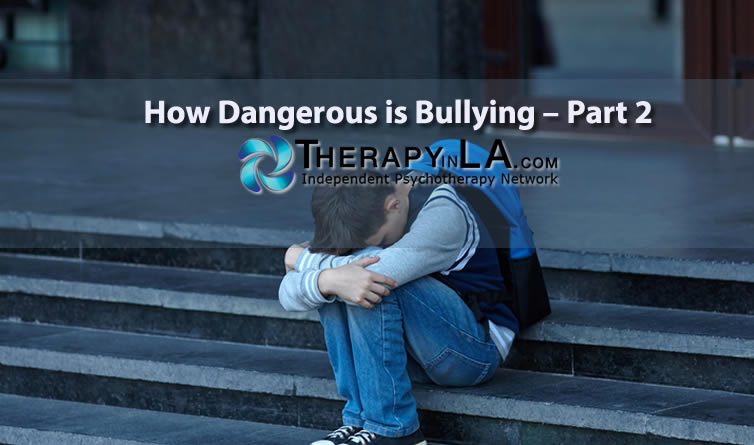How Dangerous is Bullying – Part 2
How Dangerous is Bullying – Part 2
A recent blog, “How Dangerous is Bullying?” is further emphasized by a recent article from the Canadian Broadcasting Corporation: “Bullying isn’t just a problem, it should be considered a national emergency based on the stunning statistics.” The executive director and co-founder of BullyingCanada, Rob Benn-Frenette cited alarming statistics. (Ken Pope: Bullying Isn’t Just a Problem, It Should Be Considered a national Emergency).
Forty-seven percent of all parents in a Canadian survey reported that their child was a victim of bullying. Almost half of kids makes it an emergency, not just a problem. The numbers in the US are probably quite similar.
The effects of being bullied, especially if help is not provided, are very long-term, perhaps for the rest of someone’s life. One call came from a middle school girl who had just slit her wrists and was sitting in her bedroom closet. Her “owners”, as she called the kids who were bullying her and controlled her life, had told her to kill herself. Her call was to ask that the support program inform her parents, so that they and not a younger sibling would find her. The responder was able to get help to her in time to save her life.
Another came from a six-year-old boy, who was desperate for relief from being picked on at the school playground. A few hours with him on the phone began a healing process.
One of my own patients who was bullied starting at 6 years old in a very middle-class elementary school, carried the trauma with him into middle and high school, and even university, where he was traumatized further. His marriage involved a bullying spouse, who angrily demanded that he meet all her demands and expectations, to which he responded with re-doubled efforts to please her (and stop the emotional attacks). He ended up exhausted, depressed, and feeling himself to be of little worth, no matter how much he succeeded in professional endeavors, as well as being a nurturing father to his children and a supportive spouse. It took some intensive and ongoing therapy to help him begin to find some relief.
Alan M. Solomon, Ph.D. is clinical psychologist in private practice in Torrance, CA. A member of the Independent Psychotherapy Network, he can be reached at 310 539-2772 or dralanms@gmail.com
Copyright 2019 by Alan M. Solomon, Ph.D.

